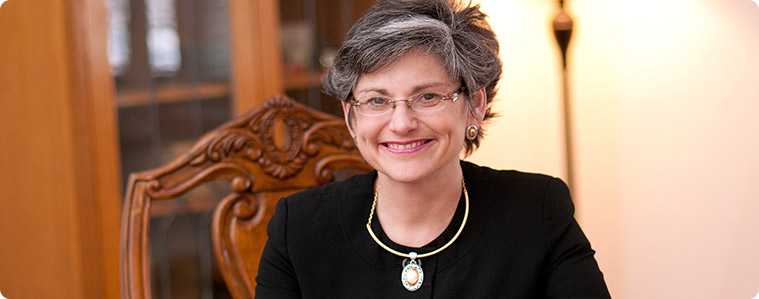Interview with President Waded Cruzado

Our feature article for this month celebrates the heritage of our university president, Waded Cruzado. A native of Puerto Rico, President Cruzado is the 12th president of Montana State University and is the first woman president and minority president to serve within the Montana University System. Since she came to MSU in 2010, our university has grown in enrollment, retention, research and philanthropic support. You can read about her many accomplishments here. For Diversity Matters, we asked President Cruzado a few questions to help us get to know a little bit about her heritage. She was kind enough to allow us to share her story with you.
For those of us who have not been to Puerto Rico, can you briefly describe how it differs from or how it reminds you of Montana?
PWC: The first difference I think about between Puerto Rico and Montana is the geographical discrepancy: Puerto Rico is a tropical island in the Caribbean Sea, and Montana is a continental western state with a semi-arid climate. Puerto Rico is the smallest of the Greater Antilles; its total area would fit about 42 times in Montana, the fourth largest state in the nation. And yet, there are almost 3.5 million inhabitants in Puerto Rico, while Montana just recently crossed the one million inhabitants mark. You would think that these differences would make for two very different cultures. Yet, there are so many similarities between Montanans and Puerto Ricans: They are both very friendly and very authentic people. I love Montanans because they are very close to their families and have a profound sense of place, all traits that remind me of my native homeland.
I have heard you talk about the important influence of your family in your own journey. Is there someone who was your mentor who encouraged you to go to college?
PWC: My family had very strong women, starting with my maternal grandmother, who lived in the house where I grew up. In addition, during my childhood, my two maternal aunts were also part of the household, all of whom provided me with a lot of love and attention. I was my family's first daughter, granddaughter and niece: I had the treasure of their time and devotion. My grandmother taught me how to read before I started school, which was an incredible gift. It opened my curiosity about books and learning. From that advantageous vantage point, it became evident that attending college was the natural and logical next step after high school. As easy and simple as it appeared to me growing up, it was in my adulthood that I understood what it all meant: that no one in that household—not my mother, grandmother, stepfather, aunts, none of them—had ever had an opportunity to experience and understand higher education, and yet they raised a girl with a firm belief that going to college was a perfectly normal thing to do.
What led you to become a college professor and then a University President?
PWC: That is easy! As mentioned before, I fell in love with books from an early age. I read everything: novels, history, poetry—even the Farmers' Almanac I would read! And I fell in love with the exhilaration of learning. Therefore, when asking myself what I wanted to do for the rest of my life, I understood that I wanted to keep learning and have an opportunity to communicate what I had learned to others. So, what is that profession that would allow me the privilege of devoting my life to intellectual inquiry and to stimulating the curiosity of others to learn and expand knowledge? Being a college professor, of course! That is my true vocation, and I would have never done anything differently.
You are an avid supporter and advocate for the land-grant mission and attended the land-grant University in Puerto Rico. How has your experience as a student at a land-grant University shaped your leadership here at MSU?
PWC: Like many people who have attended a land-grant university, I have a profound respect and gratitude for land-grant institutions. Had it not been for this seminal accomplishment—truly a feat of American democracy—I would not have been able to afford a college education. Moreover, had it not been for the inclusive spirit of the Morrill Act and the establishment of this new brand of higher education institutions that were called to educate the sons and daughters of the working families of America (the first time that a Congressional bill included the word "daughter"), I would not have been able to even dream of entering the revered halls of academia. Therefore, it is very clear to me that land-grant universities are a vital manifestation of what has proven to be one of the most transformational pieces of legislation in our nation's history. And today, just as in 1862, we hold the gift of hope in our hands—that a better and brighter future is possible when we educate more people rather than fewer.
